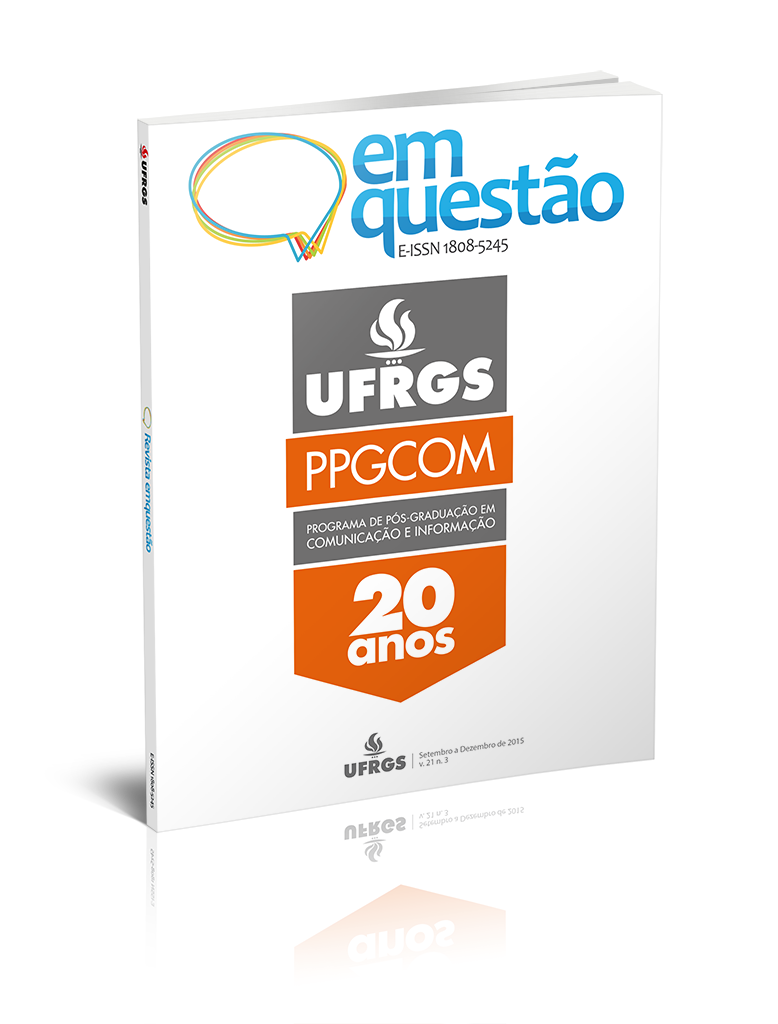Olhares complementares sobre letramento científico e o papel dos pesquisadores em comunidades virtuais
DOI:
https://doi.org/10.19132/1808-5245213.271-295Palabras clave:
Comunicação Científica. Webometria. Letramento Científico. Blogs. Pesquisadores Brasileiros.Resumen
Este é um estudo webométrico sobre a discussão em torno das audiências a serem privilegiadas no que tange aos impactos e à incidência das informa- ções de caráter científico. A pesquisa verifica de que maneira e com qual intensidade essas modificações no fluxo informacional ocorrem no ambiente virtual. Para tanto, realiza-se um levantamento de quatro blogs identificados no Anel de Blogs ABC: Um Longo Argumento, Via Gene, Cultura Científica e Neurocientista de Plantão. O estudo utiliza o software SocSciBot4 (Thewall, 2013) na categorização das postagens realizadas pelos pesquisadores responsáveis no período entre janeiro e dezembro de 2012. O estudo ainda afirma que a possibilidade de novas formas de letramento científico é concretizada na web e infere que, sob esse viés, é prudente observar o quanto uma nova forma de comunalismo vem se manifestando na rede no sentido de viabilizar estratégias de letramento científico.Descargas
Citas
ALBAGLI, S. Divulgação científica: informação científica para a cidadania? Ciência da Informação, Brasília, v. 25, n. 3, p. 396-404, set./dez. 1996.
BARDIN, L. Análise de conteúdo. 4. ed. São Paulo: Martins Fontes, 2004.
BUENO, W. C. Jornalismo científico no Brasil: o compromisso de uma prática independente. Tese (Doutorado em Comunicação) - Escola de Comunicação e Artes, Universidade de São Paulo, São Paulo, 1984.
BUENO, W. C. Comunicação científica e divulgação científica: aproximações e rupturas conceituais. Informação e Informação, Londrina, v. 15, n. especial, p. 1-12, 2010.
BOURDIEU, P. O senso prático. Petrópolis, RJ: Vozes, 2011.
CRESWELL, J. W. Projeto de pesquisa: métodos qualitativo, quantitativo e misto. 2. ed. Porto Alegre: Artmed, 2007.
FAYARD, P. La Communication scientifique publique. In: FAYARD, P. (Org.). De la vulgarization à la médiatisation. Lyon: Chronique Sociale, 1988.
FRAGOSO, S; RECUERO, R.; AMARAL, S. Métodos de pesquisa para in-ternet. Porto Alegre: Sulina, 2011.
FRANCHI, E. Pedagogia da alfabetização: da oralidade à escrita. São Paulo: Cortez, 1989.
FREIRE, P. R. N. Educação como prática da liberdade. Rio de Janeiro: Paz e Terra, 1967.
GARVEY, D. W. Communication: the essence of science facilitating infor-mation among librarians, scientists, engineers and students. Oxford: Pergamon, 1979.
MERTON, R. K. Sociologia: teoria e estrutura. São Paulo: Mestre Jou, 1970
MAMEDE, M.; ZIMMERMANN, E. Letramento científico e cts na formação de professores para o ensino de física. In: SIMPÓSIO NACIONAL DE ENSI-NO DE FÍSICA, 16., 2007, São Luís. Anais... São Luís, 2007.
MUELLER, S. P. M.; PASSOS, E. J. L. As questões da comunicação científica e a ciência da informação. In: MUELLER, S. P. M.; PASSOS, E. J. L. (Org.). Comunicação científica. Brasília: UNB, 2000. p. 13-22
RHEINGOLD, H. Comunidades virtuais. In: DRUCKER, P. (Org.). A comu-nidade do futuro: idéias para uma nova comunidade. São Paulo: Futura, 1998. cap. 11, p. 120-127
SANTOS, G. L. A telemática a serviço da alfabetização científica e tecnológica de professores de 1o. e 2o. graus dos países membros do Mercosul. Colabor@, Curitiba, v. 1, n. 4, p. 35-44, 2002.
SOUSA, R. S. C. Trilhas de comunicação científica: links de postagens de pesquisadores brasileiros nos blogs de ciência. 2011. Tese (Doutorado em Co-municação e Informação) – Curso de Pós-Graduação em Comunicação e Infor-mação, Universidade Federal do Rio Grande do Sul, Porto Alegre, 2011.
TARGINO, M. G. Comunicação científica: uma revisão de seus elementos bási-cos. Informação & Sociedade, João Pessoa, v. 10, n. 2, p. 37-85, 2000.
THELWALL, M. Link analysis: an information science approach. Amsterdam: Elsevier Academic, 2004.
THELWALL, M.; VAUGHAN, I.; BJÖRNEBORN, L. Webometrics. Annual Review of Information Science and Technology, Medford, v. 39, p.81-135, 2005.
THELWALL, M. SocSciBot 4. 2013. Disponível em: <http://socscibot.wlv.ac.uk/>. Acesso em: 08 set. 2013.
ZIMAN, J. M. Conhecimento público. Belo Horizonte: Itatiaia, 1979. (O Homem e a Ciência, 8).
Descargas
Publicado
Cómo citar
Número
Sección
Licencia
Derechos de autor 2015 Rodrigo Silva Caxias de Sousa, Leilah Santiago Bufrem, Bruna Silva do Nascimento

Esta obra está bajo una licencia internacional Creative Commons Atribución 4.0.
Autores que publican en esta revista están de acuerdo con los siguientes términos:
Los autores mantienen los derechos autorales y ceden a la Revista el derecho de la primera publicación, con el trabajo licenciado bajo la Licencia Creative Commons Attribution (CC BY 4.0), que admite compartir el trabajo con reconocimiento de la autoria.
Los autores tienen autorización para asumir contratos adicionales en forma separada, para la distribución no exclusiva de la versión del trabajo publicada en esta Revista, como para publicar en repositorio institucional, con reconocimiento de autoria y publicación inicial en esta Revista.
Los artículos son de acceso abierto y gratuitos. Según la licencia, usted debe dar crédito de manera adecuada, brindar un enlace a la licencia, e indicar si se han realizado cambios. No puede aplicar términos legales ni medidas tecnológicas que restrinjan legalmente a otras a hacer cualquier uso permitido por la licencia.













